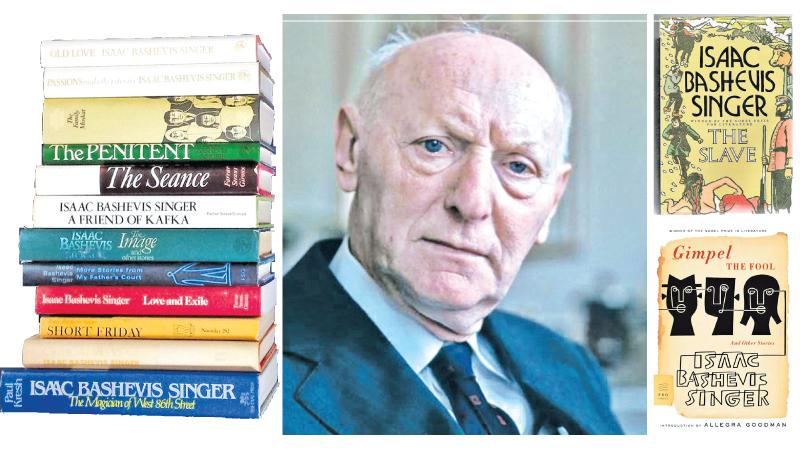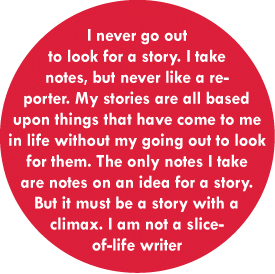
Isaac Bashevis Singer is a Polish-born American writer of novels, short stories, and essays in Yiddish. Yitskhok Bashevis Zinger, his original name, was born on July 14 1904, Radzymin, Poland, Russian Empire, and died on July 24, 1991, Surfside, Florida, US.
Bashevis Singer is the author of 19 novels, 12 collections of short stories, 19 young adult novels and 7 biographical books. Among his most important novels are The Family Moskat (1950; Di familye Mushkat, 1950), The Magician of Lublin (1960; Der kuntsnmakher fun Lublin, 1971), and The Slave (1962; Der knekht, 1967).
Singer’s popular collections of short stories in English translation include Gimpel the Fool and Other Stories (1957; Gimpl tam, un andere dertseylungen, 1963), The Spinoza of Market Street (1961), Short Friday (1964), The Seance (1968), A Crown of Feathers (1973; National Book Award), Old Love (1979), and The Image, and Other Stories (1985).
Thanks to his great literary works, he won the Nobel Prize for Literature in 1978. His fiction, depicting Jewish life in Poland and the United States, is remarkable for its rich blending of irony, wit, and wisdom, flavoured distinctively with the occult and the grotesque. His art of fiction and writing tips are best revealed in his Paris Review interview conducted by Harold Flender. Following is his writing tips for budding writers:
1. Do not explain
 Many writers follow other writers’ techniques, when they start out writing. How about Singer? He says, “my model was my brother, I. J. Singer, who wrote The Brothers Ashkenazi. I couldn’t have had a better model than my brother.”
Many writers follow other writers’ techniques, when they start out writing. How about Singer? He says, “my model was my brother, I. J. Singer, who wrote The Brothers Ashkenazi. I couldn’t have had a better model than my brother.”
But what is the main rule he learnt from his brother?
“One of his rules was that while facts never become obsolete or stale, commentaries always do. When a writer tries to explain too much, to psychologize, he’s already out of time when he begins. Imagine Homer explaining the deeds of his heroes according to the old Greek philosophy, or the psychology of his time. Why, nobody would read Homer! Fortunately, Homer just gave us the images and the facts, and because of this the Iliad and the Odyssey are fresh in our time. And I think this is true about all writing. Once a writer tries to explain what the hero’s motives are from a psychological point of view, he has already lost.
“This doesn’t mean that I am against the psychological novel. There are some masters who have done it well. But I don’t think it is a good thing for a writer, especially a young writer, to imitate them. Dostoyevsky, for example. If you can call him a writer of the psychological school; I’m not sure I do. He had his digressions and he tried to explain things in his own way, but even with him his basic power is in giving the facts.”
2. A story should be a story
Bashevis Singer’s childhood reading was ‘Adventures of Sherlock Holmes.’ But can someone learn anything from Sherlock Homes stories? Singer says though the stories of Sherlock Holmes did not have any influence on him, he learnt the importance of tension of a story through them.
“From my childhood I have always loved tension in a story. I liked that a story should be a story. That there should be a beginning and an end, and there should be some feeling of what will happen at the end. And to this rule I keep today. I think that storytelling has become in this age almost a forgotten art. But I try my best not to suffer from this kind of amnesia. To me a story is still a story where the reader listens and wants to know what happens. If the reader knows everything from the very beginning, even if the description is good, I think the story is not a story.”
3. I only note down an idea for a story
How do you come to write a story? Do you observe all the time, like a reporter? Do you take notes? Singer’s answer for this is like below:
“I never go out to look for a story. I take notes, but never like a reporter. My stories are all based upon things that have come to me in life without my going out to look for them. The only notes I take are notes on an idea for a story. But it must be a story with a climax. I am not a slice-of-life writer. When such an idea comes to me, I put it down in a little notebook I always carry around. Finally the story demands to be written, and then I write it.”
4. Disturbance is a part of human life
How does Bachevis Singer work every day? Can he write in a noisy place?
“Well, when I get up in the morning, I always have the desire to sit down to write. And most of the days I do write something. But then I get telephone calls, and sometimes I have to write an article for the ‘Forward’. And once in a while I have to write a review, and I am interviewed, and I am interrupted all the time. Somehow I manage to keep on writing. I don’t have to run away. Some writers say that they can only write if they go to a far island.
They would go to the moon to write so as not to be disturbed. I think that being disturbed is a part of human life and sometimes it’s useful to be disturbed because you interrupt your writing and while you rest, while you are busy with something else, your perspective changes or the horizon widens. All I can say about myself is that I have never really written in peace, as some writers say that they have. But whatever I had to say I kept on saying no matter what the disturbances were.”
5. Story construction is most difficult
What is the most difficult aspect of writing? Singer says it is story construction.
“Story construction. This is the most difficult part for me. How to construct the story so that it will be interesting. Easiest for me is the actual writing. Once I have the construction set, the writing itself—the description and dialogue—simply flows along.”
6. Write a story well
Many readers look upon Bashevis Singer as a master storyteller. Others feel that he has a far more significant purpose in his writing than merely to tell stories. What is his duty in writing?
“I think that to write a story well is the duty of a storyteller. To try with all his might that a story should come out right. What I call right is that the construction should be right, the description right, that there should be equilibrium between form and content, and so on. But this is not everything. In each story, I try to say something, and what I try to say is more or less connected with my ideas that this world and this kind of life is not everything, that there is a soul and there is a God and there may be life after death.”
7. Don’t be afraid of any inventions
Singer was a writer who always encouraged young people to think of serious writing as a way of life.
“…. if a young man would come to me and I can see that he has talent and he asks me if he should write, I would say go on and write and don’t be afraid of any inventions and of any kind of progress. Progress can never kill literature, any more than it can kill religion.”
